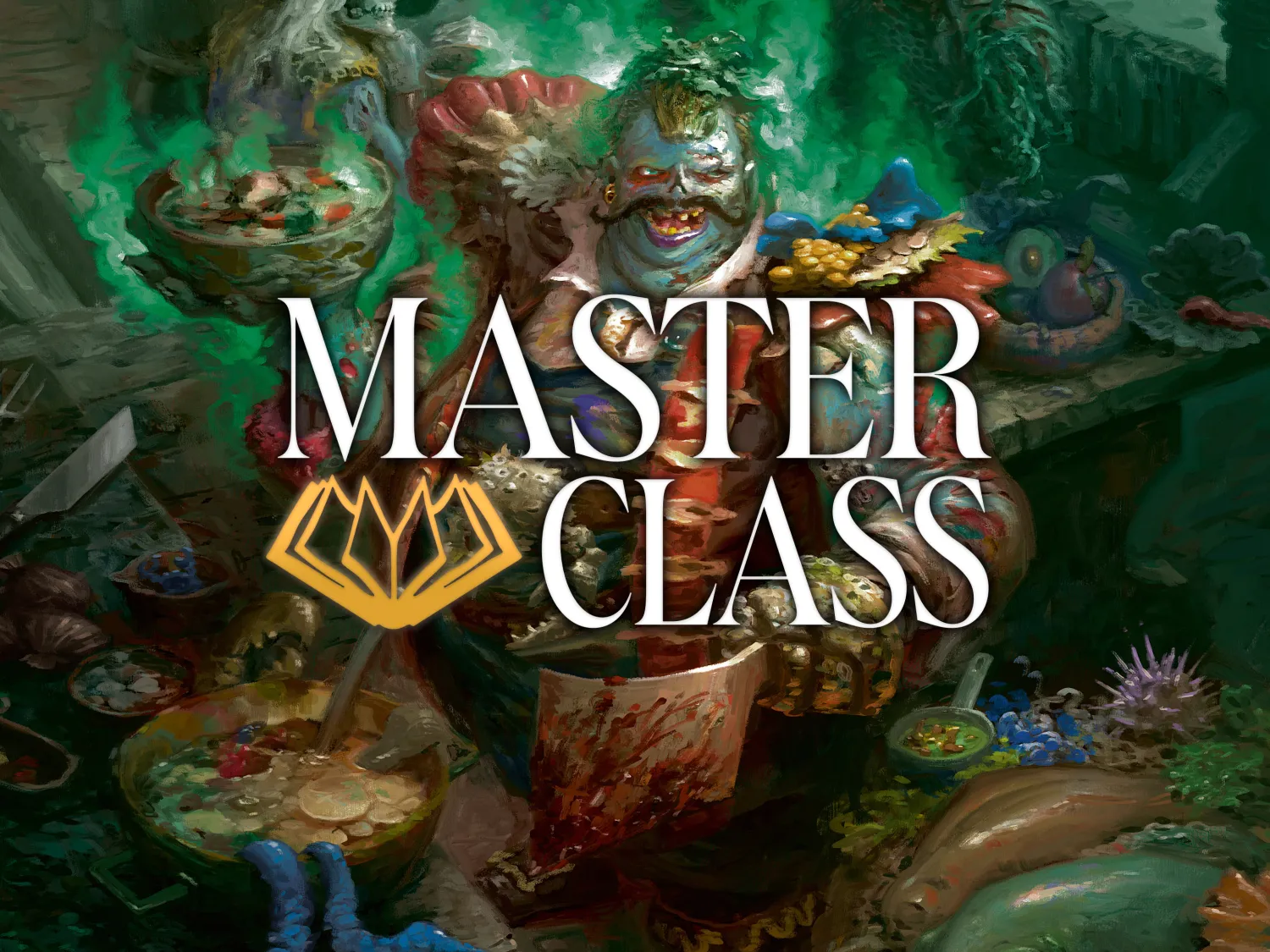Learn from the best with a monthly Masterclass lesson from renowned pro player Yuki Lee Bender. This month, Yuki breaks down how prepare for upcoming tournaments, not with cards, but physically and mentally, so you can be at the top of your game!
You have a month to prepare for a Flesh and Blood tournament, so what kinds of things do you spend your time on in order to be successful?
Maybe it's draft strategy, understanding the metagame, deck selection, side boarding, or honing strategies into key matchups. Generally, the first things that come to mind are things that help us master and understand the game of Flesh and Blood itself. And for good reason! We are, after all, playing a Flesh and Blood tournament. However, what about all the non-game-related aspects of preparation that can help us be successful when it comes to the actual tournament day? These things include ensuring you have good personal health and a strong mental game at the event.
Being in good health through good nutrition, exercise, and sleep helps us make sure our body and mind are ready to perform so that we can utilize the knowledge we’ve gained leading up to the event to the fullest. Having a strong mental game and setting healthy goals for events can help prevent us from tilting or getting frustrated when mistakes or losses start to happen. Focusing on our personal health and our mental game help prevent us from making uncharacteristic mistakes or sloppy plays during the tournament, which can often be the difference between a win and a loss.
The idea that personal health and cultivating a strong mental game are important to tournament success is probably not an idea that’s new to you. You probably even believe it to be true. However, in my own experience, many players do not actually put in the effort to prioritize their own wellbeing leading up to an event. It’s so easy to just put our heads down and focus on the prize at the expense of self-care. We might prioritize those extra last minute reps over a bit of exercise, over taking the time to get a healthy meal, or even over those extra couple hours of sleep right before the tournament. I am guilty of this myself, and only recently have I really internalized that doing this is a mistake. That doesn’t mean you can’t have successful tournaments where you don’t take care of yourself. But, I truly believe that I perform best when I take some time away from preparation and focus on self-care.
Personal health being linked to positive performance is something that is very well researched in areas like sports and chess, and is a big focus for professional athletes or chess players. But it's easy to overlook in card games, as we don’t get to have personal coaches to help us with all these things. Most of us are just doing what our friends told us or what seems to work through trial and error. But a more deliberate approach can really make a huge difference to your tournament success.
In this article, I want to share with you my own personal experiences competing in Flesh and Blood events that have lead me to really and truly learn the importance of self-care and building a strong mental game. I also want to give you some actionable tips on how to focus on improving in these areas, both leading up to and during events. Improving my own practices in these areas have been a big focus for me over the last year or so of competing in Flesh and Blood and my hope is that these can give you some ideas for practice you can try yourself.

My name is Yuki, I play, coach and write about Flesh and Blood as my job. I’ve played every Pro Tour and World Championship for Flesh and Blood, and enough Callings that I’ve started to lose count of them all. Early in my Flesh and Blood career I was working as a teacher and Flesh and Blood was very much a hobby, but despite this, I had many of my strongest tournament results during this period. After I stopped teaching and focused more on Flesh and Blood, I started to notice myself doing worse at tournaments, despite having more time to practice. This seems counterintuitive and might be attributable to luck or variance, but I started to wonder if there was some sort of underlying reason why this seemed to be the case.
A consistent trend I started experiencing was very strong Day 1's into abysmal Day 2's. A 7-1 record in Day 1 into a 7-6 drop and fail to cash on Day 2 was becoming a persistent pattern for me at Tier 4 events. Similar patterns of strong Day 1's into very poor Day 2's plagued me at Pro Tour: Amsterdam, World Championship: Osaka, Pro Tour: London, National Championships, and even a few Callings. At first it was easy to point towards variance or things just not working out, but at some point, you realize it has to be more than that. I’ve spent a few seasons trying to change how I test or what I focus on in hopes of breaking this trend, but for a long time nothing seemed to work. No amount of hard work or dedication seemed to be able to lift the “curse”.
One thing that really ended up opening my eyes were some stream comments on one of my feature matches that said I looked exhausted while playing my game in Day 2. I looked at myself on camera and noticed they were right. Upon further reflection, I realized my energy levels going into most of these Day 2's were terrible and I was making lots of small mistakes I wouldn’t normally make, that were causing me to lose games I could have won. I was having more consistent Day 1's and better results in single day events like Pro Quests or World Championship Qualifiers than ever, but struggling to convert in longer multi-day events. From this it became apparent I needed to do something to improve my stamina and energy levels.
Taking this learning to heart, I tried to figure out what I could do to improve it. What I realized is that I had been traveling a lot, and as a result my diet and exercise had really deteriorated, which was leading to stamina issues during events. Additionally, at many events I was too focused on my teammates and socializing and would often sacrifice a good night's sleep, which further contributed to these problems.
Additionally, I realized that while I previously prided myself on a strong mental game, at some point I had started to place unfair expectations upon myself around performing well. This meant that once things started to go downhill on Day 2 of a tournament, I would start to get frustrated and tilt, which would cause a downward spiral in my performance.
Over the past year, I’ve been focusing on finding ways to improve my personal health and stamina leading up to and during events, through proper exercise, sleep, and nutrition. Additionally, I’ve been working on setting more healthy goals and expectations to help avoid tilt and frustration if I do start losing in Day 2. This has been a gradual journey for me with ups and downs, but has been very worthwhile and led to some recent tournament successes which I will touch on in more detail later.

Personal Health
To tackle the issues around poor stamina and energy levels, I really wanted to focus on my health by improving my exercise, sleep, and nutrition. These of course are long term goals, and extend beyond the tournament themselves, but also should apply to the days leading up to the event.
Exercise
Research shows that exercise is linked to good sleep, improved stamina, improved cognitive function, and more, which means regular exercise can help you perform at Flesh and Blood events! Having a regular exercise routine is something basically every professional chess player does, but often gets overlooked by TCG players as we don’t have personal trainers that can guide us. I won’t go into all the specifics of how to work out, but I think a good rule of thumb is to try and make sure you have regular physical activity each week. I personally really recommend finding a type of exercise you find enjoyable, which for me means hiking, skiing, climbing, and racket sports.
I’ve always been a big fan of the outdoors, and exercise is usually part of my weekly routine. However, I often find that when I travel all of my routine goes out the window, and as a result I also don’t tend to exercise much leading up to events when it is the most crucial. What I have recently started doing to solve this, is intentionally setting aside time each day to do some kind of physical activity, even while I’m out of town. In Singapore, our whole team was partaking in physical activities around 4:00pm in the afternoon. This was a great opportunity for us to take a mental break from testing and to engage in some team building each day. Even if you don’t travel with a team, I would really encourage you to make plans with a friend to do something fun and active in your days leading up to the event itself. It helps not only with your personal fitness and stamina during the event, but also helps you sleep well at night, which is another crucial factor to performance.
Sleep
Sleep is something we all do every day, and is essential to our health, wellbeing, and cognitive function. It goes without saying that a good night’s sleep helps us perform in Flesh and Blood, but it’s easy to compromise your sleep with last minute tournament preparations, social functions, or even just one more game with a pal. What I’ve found very effective is setting a strict sleep schedule, leading up to and during the event. Even if I’m at the location early, getting in some valuable in-person testing, I make sure to start winding down by 11:00pm at the latest to ensure I’m able to get a good night’s sleep. I’m still happy to socialize or go to dinners with friends during the event, I just make sure I’m back at my accommodation early enough to have time to wind down and get a proper rest.
Additionally, if I go to the location a few days in advance, I set my alarm so that I am waking up when I would need to wake up for the actual tournament. This helps make sure that my body is accustomed to being awake at the proper time and that I’m not groggy on the actual tournament day. In Singapore, our whole team was on a schedule where we’d be waking up early to start testing at 9:00am every morning, which also in turn helped encourage a healthy sleep pattern for everyone. We also found that winding down early helped ensure the games we were playing were high quality, instead of continuing to jam games late into the evening where the quality of our play tends to drop.
Adding in travel and different time zones to the mix can further compound sleep issues. For this reason, I usually try to leave a bit early for international events so I can have at least a day or two to let my body adjust to jetlag and to experience the place I am traveling to. Those extra days are also perfect for fitting in a little bit of focused in-person testing.
However, going early isn’t always possible, as we have other life obligations and time off work can be expensive. If you find yourself traveling with a short turn-around time, I find it helpful to make sure I am well rested before I leave, and sometimes I even partially adjust my sleep schedule to match the time zone I am traveling to. Both of these practices I find helpful for partially offsetting jetlag.
Nutrition
Food is our mind and body’s fuel and is essential to letting us function and perform. However, when we are traveling and when we are at tournaments, it’s easy to eat poorly. I try to eat healthy food that makes me feel good, especially on the day before the tournament as well as on tournament days themselves. This often looks like something with lots of vegetables and a lean protein like chicken or fish, although I encourage you to find something you enjoy that works well for you. I also specifically try to avoid foods that are heavy and might make me feel tired or give me indigestion and negatively impact my sleep.
Additionally, during events I always like to have a plan for food before I arrive at the venue. For me, this means setting aside time in the morning to find a nice breakfast and some coffee. I usually like to figure out where I’m going beforehand so I don’t have to rush in the morning. I also like to have some small snacks I can easily eat in between rounds to can keep me fueled throughout the day, without eating so much that I start to feel tired or sleepy afterwards. Some of my favourite snacks include fruit, nuts, granola bars, onigiri, and dark chocolate, which is very low in sugar. Generally, I recommend avoiding heavy foods which can make you tired, or foods that are high in sugars which can make you crash. If you’re someone who likes to have caffeine more than once a day, you may also want to make sure you account for that, although coffee is generally available at most venues.

Mental Game
Another big area of focus for me has been around improving my mental game. This practice looks at the kinds of things I think and say to myself before and during events to help ensure I’m in a healthy headspace where I can perform. Flesh and Blood tournaments can be stressful, and when the stakes are high it’s easy for frustration or tilt to seep in, which can really undermine our ability to play the game well. Mental game is a huge topic that extends way beyond the scope of this article, but I want to highlight a few things that I’ve been implementing recently to help improve my own mental game.
Goals and Expectations
Often, a big source of tilt or frustration during tournaments comes from us placing expectations upon ourselves and then not living up to said expectations. These expectations can sometimes be explicit, in the form of goals we have intentionally made, but they can also be implicit, where we have subconsciously come to expect a certain result or performance from ourselves even if we have never actually said as much. Taking the time to think about what we expect from ourselves and set healthy goals is a big part of the way we can avoid experiencing tilt during events. Keep in mind that while I will share my own personal preferences regarding goals, everyone is different, and what works for me may not necessarily work for you. I encourage you to experiment with the types of goals you set for yourself, and find what works best for you.
When setting goals for events, I personally avoid placement or record-based goals. The main reason for this is that often our record in a tournament and which games we win or lose are not fully under our control; there are many factors like matchups, in-game variance, and more that can cause us to lose games we didn’t even make mistakes in. I also find that if I expect myself to achieve at least a certain record, I tend to get very stressed as I get close to that minimum record, and can get frustrated if I lose more games than I had originally set for my goal. It also tends to take my focus during tournaments away from playing the games themselves, and more on things like if I win or lose, and how many losses I can afford. Taking my focus outside of the game is something I do not find to be conducive to performing well. In short, I personally find placement-based goals to be a recipe for disappointment and tilt.
Instead of placement-based goals, I like to focus on playing well and making the best decisions I possibly can during my games of Flesh and Blood. What I like about this goal is that it helps me focus on making good plays, which is ultimately what I want to be doing during my tournament games. Generally, I find that good plays lead to good results which makes this an ideal goal. Another perk of this goal is that even if I lose a game and that is disappointing, it feels good to be able to be proud of how I played. One potential pitfall with this goal that I have personally run into, is that I can get very frustrated if I lose games due to my own misplays. While it’s good to have the goal to play well, it’s also important to be realistic with yourself and set an expectation that you might make some mistakes during your games, and that’s okay. If I notice myself make a mistake and I find myself getting frustrated, I try to pause and mentally tell myself that it’s okay that I made that mistake, and that I just need to focus on how to play the best I can from the current game state. I can reflect on why I made that mistake after the tournament finishes.
I also like to set a goal around having good tournament preparation, which includes accurately predicting the metagame, making a good deck choice for the event, and having well developed gameplans into the most represented decks. This allows me to reflect on my testing process leading up to the event, and see if I think I was well prepared or if I have areas to improve on. I think focusing and reflecting on your testing process is valuable, regardless of your record in the event, and it's a big reason why I like to set these goals. I have definitely had tournaments where I don’t personally perform well, but I feel like my testing went well, I have teammates on the same deck who did well, and I’m happy with my decisions at that tournament, which overall makes the event a success.

Does it Work?
Prioritizing my personal health and mental game has been a gradual journey for me. It’s a smaller sample size, but the two events I have done the best in recently are also the ones where I’ve been taking care of myself the best physically and mentally. First, at the High Seas World Premiere in Taipei, I was very active and focused on wellbeing leading up to the event, since there is very little preparation to be done for World Premieres. During this event I noticed I still felt and played very well during Day 2 in a way I hadn’t in quite some time. For me, this really highlighted that my recent efforts were a step in the right direction and that I should continue to work and focus on taking better care of myself. However, in many ways this event was easy mode since it’s far easier to take care of yourself when you don’t have to balance tournament preparation as well. The real challenge for me would be implementing these changes in a larger tournament where extensive preparation is required.
Fast forward to Pro Tour: Singapore, exactly the kind of challenge I was looking for, a premier level event with plenty of preparation, where I would need to make sure I balance my practice with my self-care. At this event I implemented all the previously mentioned tips in this article, including regular exercise, prioritizing sleep, proper nutrition, and healthy goal setting, and was blessed with very good results. Singapore started out as good as possible with an 8-0 record at the end of Day 1.
However, Day 2 started in a similar way with a rough draft that put me at 1-2, followed by a constructed loss. In the past I recognize that I would have tilted and continued to spiral downwards in these situations. But I reassured myself that I was well practiced and that even if I had made mistakes, I had also made good plays. The best course of action was to leave those mistakes behind me, reset, and focus on the games that I had ahead of me. While I ultimately fell short of Top 8, I would go on to win two of my next three games and play very well in all of them, putting me at a 11-4 finish for 12th place overall.
While losing four games after an undefeated record in Day 1 was disappointing, I’m very proud of the progress I’ve made in staying focused and playing well in Day 2, even after things started to go downhill. To me this was a very successful event not only in terms of the result itself, but especially in terms of my own personal growth and successful implementation of all the self-care practices I’ve been building over the past year. I still expect to have bad events in the future, losing sometimes is unavoidable. But I am excited to continue playing events with more of a balanced focus, and I am confident that it will lead me to more successes in the future.
Achieving good personal physical and mental health surrounding events is an individualized process, and you will likely need to experiment with different approaches over time to find out what works for you. It’s also something that you can have for one event, and then slip up on at a future event, so consistent and sustained efforts are important. Hopefully my own experiences and learnings can help you in your own journey to personal well being and better tournament results.